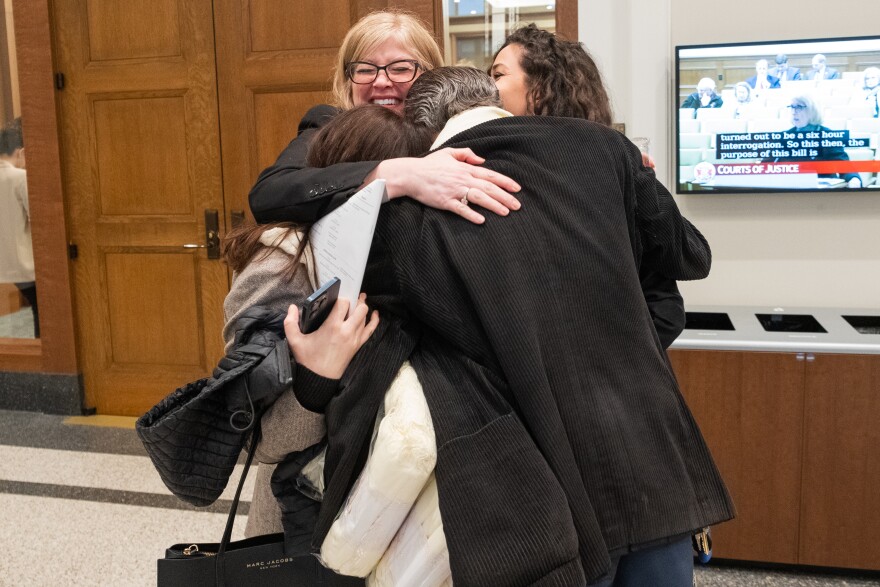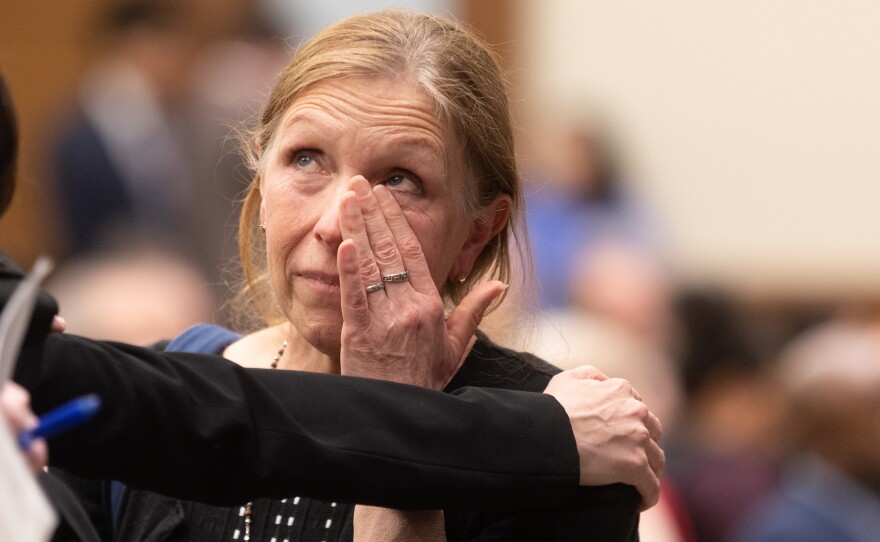Brigitte Combs came to the Virginia Capitol in February when she learned legislators were discussing an issue she cares about. She took a gulp of air and addressed a Senate committee.
“Mr. Chairman, members of the committee. I’m Brigitte Combs. I’m a Virginia resident and a child marriage survivor,” the Hanover County resident told the 15 senators arrayed before her.
Combs’ comment to the Senate courts committee was part of an effort to push lawmakers to make Virginia the 12th state to raise the minimum age of marriage to 18. At 15, while pregnant, Combs married a 37-year-old man in Texas.
The effort was successful, at least on the legislative front. The bill to raise the age passed the legislature with bipartisan support. But before it becomes law, it has to be signed by Gov. Glenn Youngkin, who hasn’t indicated his intentions.
Currently, Virginia law allows 16 year olds to marry, like most states; it also requires a judge to emancipate the minor. But Combs said that isn’t enough.
“It didn’t matter if I was 15 or 17, because my parents would have done or had me do whatever was necessary to get me married,” she said. “With all due respect, does anyone here actually think a vulnerable young person in fear of their parents or even God himself is going to protest?”
The advocacy group Unchained at Last said that between 2000 and 2021, nearly 8,000 Virginians younger than 18 got married, and in more than 7,000 instances the marriages “should have constituted a sex crime.” Between 2000 and 2018, nearly 300,000 minors — almost all girls — were married in the U.S.
“Through time, and getting to meet people, then I found out more about it. And found out yeah, this is actually still a thing,” Combs said. “It's happening in America. It wasn't just me.”
Naomi Cahn, a professor at the University of Virginia School of Law, said a movement to change laws across the country has been successful during the past decade.
She attributed the changes to both advocacy and shifting norms around pregnancy — which is often used as a way to justify teen marriage.
“Sexual activity and — or at least pregnancy and marriage during the teen years — is, in general, going down as a social matter,” she said.

Cahn said Virginia was one of the first states to make changes, when it effectively raised the marriage age to 16 in 2016 by imposing the emancipation requirement and other judicial hurdles.
The legislation was the result of an effort to raise the age to 18, which ultimately failed. The law currently on the books was seen as a compromise and a way to reduce the number of children getting married.
“It’s not just a hearing, the court has to make written findings that the minor is voluntarily entering into the marriage and not being compelled against the minor’s will to do so,” Cahn said of the current law. “Unlike [the] previous law, where a pregnancy would have been enough to constitute a reason to get married, that's not enough of a basis for a court to enter this order of emancipation.”
Casey Swegman, of the Tahirih Justice Center, which advocates on behalf of immigrant girls and for raising the minimum age to marry, said the law reduced how many children were being married.
“I think the process itself is a deterrent for most people who are afraid of being caught doing something bad. But for those most vulnerable, it's not catching them,” Swegman said.
Delaware was the first state to set the minimum age at 18 in 2018. Washington Gov. Jay Inslee signed that state’s legislation into law this year.
Different forms of opposition to raising the marriage age have kept the practice legal in most of the U.S., some of which were reiterated in Virginia.
“Sometimes, it is said that children are fleeing bad homelives with their parents, but then they're fleeing a bad homelife for another bad homelife,” said Lisa Sales, president of the Virginia chapter of the National Organization for Women. “Sometimes, they're in love. But if they're truly in love, then they can wait to get married to make sure that love will last and is enduring love.”
Resistance and skepticism over changing the law come from different ideological bents, too, said Swegman, of the Tahirih Justice Center.
“There are some groups that view the right to marry as an individual liberty that minors already hold,” said Swegman. “Emancipated minors are awarded many rights, but not all: they are not allowed to vote; they're not allowed to buy cigarettes; they're not allowed to drink. Age-based restrictions still exist, even for emancipated minors. And so, why shouldn't marriage be one of those?”
But most opposition is concerned with the stigma of teen pregnancy.
The Family Foundation, a conservative faith-based organization in Richmond, argued that the current law has been working, and marriage should be an option for those who have become pregnant.
Combs is strongly against any form of exemption from the proposed legislation — including pregnancy.
“One person is too many,” she said, “I am one person. Did it not matter?”



